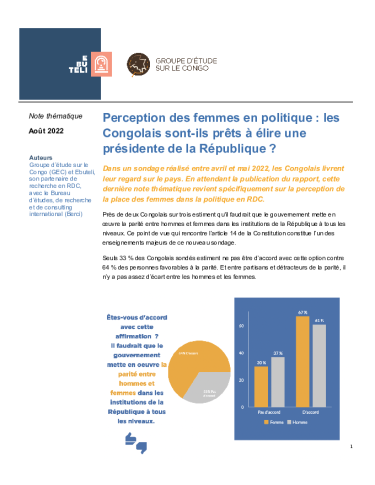Are women as likely as men to be elected head of State in the Democratic Republic of Congo for the upcoming 2023 elections? This question needs to be asked, especially since two-thirds of Congolese agree with the implementation of gender parity between men and women at all levels of institutions within the Republic.
In this new analysis, the Congo Research Group and Ebuteli, its research partner in the DRC, along with the Bureau d’études, de recherche et de consulting international (BERCI) reveals three major lessons about women in the Congolese political arena based on a survey conducted between April and May 2022.
- First, almost as many women (67%) as men (61%) want the government to implement parity, as provided for in article 14 of the country’s Constitution.
- A second lesson appears in Congolese support for women serving the state. Women MPs are the most supported: 41 percent of respondents strongly support them even if currently the National Assembly only has elected 68 deputies out of the 500 total deputies, and that during the reform of the new electoral law, legislators did not retain the option of the G13 to impose joint lists on the legislative. In addition, support for a female president, the highest office in the state, comes far behind, with only 32 percent.
- Finally, there is a gap between support for women’s candidacies for the post of head of state. 63 percent of women surveyed want it, while men surveyed are only 51 percent in favor.
Download the analysis (French-only):
Read the other notes in this series:


